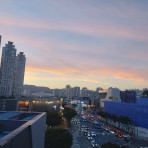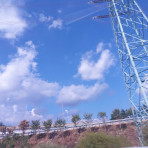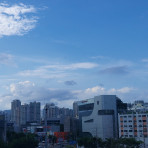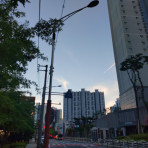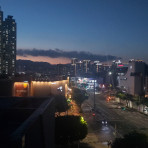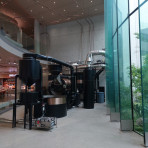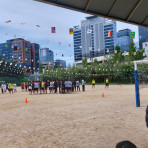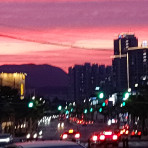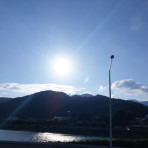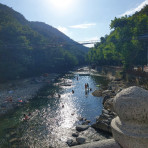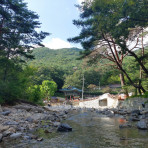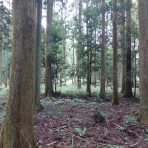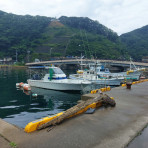Navigating cliffs, wading through rivers: How Indonesia organizes elec…
본문
Tue, 13 Feb 2024 11:05:00 -0500

For Damianus Luhat, a long-serving election official in Indonesia’s East Kalimantan province, organizing a vote is not just a civic duty but also an adventure, which includes braving rapids and cliffs and camping overnight.
For the Feb. 14 general election too, like every five years, he and other poll workers in his Long Bagan district delivered ballots and equipment to remote villages along the Mahakam River with a longboat their only means of transportation.
“It takes us eight hours to get to the farthest village. We often have to camp on the riverbank because of the distance,” he told BenarNews on Thursday.
Damianus recalled a previous election period during which his longboat packed with election paraphernalia capsized while crossing a rapid that deceptively looked like a waterfall. He and his team managed to save the election materials, but lost some of their personal belongings.
“Hopefully, everything will go smoothly this time,” he said.
Luhat is one of the millions of election workers who are preparing for Indonesia’s general election next week, which will be the largest and most complex single-day vote in the world.
It is gargantuan and complicated because eligible voters will be casting their ballots not just to elect a president and vice president, but also to vote for members of the national and regional legislatures.
And because nearly 205 million people are eligible to vote, officials have to set up more than 800,000 polling stations across the sprawling archipelago.
Workers lift election supplies destined for the logistics warehouse on Pramuka Island and meant for distribution in Thousand Islands, at the Marina Ancol Port, Jakarta, on Feb. 9, 2024. [Eko Siswono Toyudho/BenarNews]
The presidential race is a three-way contest between Defense Minister Prabowo Subianto, Anies Baswedan, a former Jakarta governor and ex-Central Java Gov. Ganjar Pranowo.
Standing for the 580 seats in the House of Representatives will be a total of 9,917 candidates from 18 national parties, according to the General Elections Commission. And around 250,000 candidates will compete for 20,000 seats at the regional level.
For all these contests the election commission needs to print ballots and transport them across the length and the breadth of the country along with ballot boxes and items such as envelopes, and candidate lists.
And to make things just a tad more difficult, the 1.2 billion ballots the commission has had to print aren’t all the same. They vary depending on the number of candidates and electoral districts.
The commission has enlisted more than 5.7 million workers and volunteers to help with the election.
Workers prepare ballot papers ahead of Indonesia’s general election next week, in Banda Aceh, Indonesia, Jan. 7, 2024. [Chiadeer Mahyuddin/AFP]
The logistics of this election are staggering, considering it will be held across a vast archipelago of more than 18,000 islands with diverse geographies and infrastructure.
Take the case of the Mentawai Islands, a group of four islands off the coast of Sumatra.
Election workers have to travel on foot for hours through hilly and forested areas to reach some of the polling stations on these islands, said Saudara Halomoan Pardede, the head of the election commission in the region.
“Our areas are separated by sea and some parts are very difficult to reach. We also have to deal with the rivers and the weather,” he told BenarNews.
The timing of the elections in February, the rainy season, has added to the challenges.
In Central Sulawesi’s Pagimana subdistrict, four policemen, a soldier and several poll workers left Thursday for a three-day journey on foot to deliver election supplies to a village that is inaccessible by any vehicle.
They will have to traverse forest trails, navigate steep slopes and wade across bridgeless rivers, all under uncertain weather conditions, said Frets Adolof Rombot, one of the policemen.
“We hope we won’t face any troubles or dangers like heavy rain or wild animals,” he told Benar News.
The complexity of the elections also poses challenges for the voters, who have to cast multiple ballots with scores of candidates, some of whom they may not know much about.
Frets Adolof Rombot (left), and a local rest after crossing a river to deliver a ballot box and other voting equipment to the remote village of Baloa Doda in Central Sulawesi province’s Pagimana subdistrict, Banggai Regency, Indonesia, Feb. 9, 2024. [Agus Tongkasi/BenarNews]
Indonesia’s elections are among the most complex in the world, according to Khoirunnisa Agustyati, executive director of the Association for Elections and Democracy (Perludem).
“The electoral districts are large, the system is open proportional, the voters are numerous, and the geographic diversity is also vast,” Khoirunnisa told BenarNews.
Aspirants compete for a seat with other parties’ rivals as well as their own. And support for a political party doesn’t necessarily mean a vote for its presidential nominee.
Khoirunnisa said that this confusion led to a high number of invalid votes in the 2019 elections, which was 11.12% or 17.5 million of the total votes cast for the House of Representatives. The number of invalid ballots for the Regional Representative Council, a parliamentary chamber similar to the Senate in the United States, was even higher, at 19% or 29 million ballots.
She said that the public is generally more interested in the presidential election, because the media publicizes it more.
“The legislative elections receive less attention and the voters have limited information about the candidates’ profiles,” she said.
Election workers check ballot boxes for the 2024 general election at the General Election Commission logistics warehouse, in Cempaka Putih, Central Jakarta, Feb. 9, 2024. [Eko Siswono Toyudho/BenarNews]
One such voter is Agung Budiyanto, a 37-year-old private employee in Tasikmalaya regency in West Java.
“I don’t even know whom to vote for besides the president and vice-president,” he told BenarNews.
He did not receive any information about the election or the candidates in his area, he said.
“There are too many people on the banners and billboards. But I don’t know any of them. I will just vote randomly,” he said.
First-time voter, 17-year-old Taghsya Rizqita Putri Amany from Jakarta, said the candidates’ programs were unclear, because their campaign materials showed only their faces and slogans.
Taghsya also feels overwhelmed by the various candidates she will have to vote for because of the various elections taking place simultaneously.
“I worry that my future will be ruined if I pick the wrong people as leaders,” she said.
Nazarudin Latif in Jakarta and Taufan Bustan in Palu, Indonesia, contributed to this report.
BenarNews is an RFA-affiliated online news organization.

For Damianus Luhat, a long-serving election official in Indonesia’s East Kalimantan province, organizing a vote is not just a civic duty but also an adventure, which includes braving rapids and cliffs and camping overnight.
For the Feb. 14 general election too, like every five years, he and other poll workers in his Long Bagan district delivered ballots and equipment to remote villages along the Mahakam River with a longboat their only means of transportation.
“It takes us eight hours to get to the farthest village. We often have to camp on the riverbank because of the distance,” he told BenarNews on Thursday.
Damianus recalled a previous election period during which his longboat packed with election paraphernalia capsized while crossing a rapid that deceptively looked like a waterfall. He and his team managed to save the election materials, but lost some of their personal belongings.
“Hopefully, everything will go smoothly this time,” he said.
Luhat is one of the millions of election workers who are preparing for Indonesia’s general election next week, which will be the largest and most complex single-day vote in the world.
It is gargantuan and complicated because eligible voters will be casting their ballots not just to elect a president and vice president, but also to vote for members of the national and regional legislatures.
And because nearly 205 million people are eligible to vote, officials have to set up more than 800,000 polling stations across the sprawling archipelago.
Workers lift election supplies destined for the logistics warehouse on Pramuka Island and meant for distribution in Thousand Islands, at the Marina Ancol Port, Jakarta, on Feb. 9, 2024. [Eko Siswono Toyudho/BenarNews]
The presidential race is a three-way contest between Defense Minister Prabowo Subianto, Anies Baswedan, a former Jakarta governor and ex-Central Java Gov. Ganjar Pranowo.
Standing for the 580 seats in the House of Representatives will be a total of 9,917 candidates from 18 national parties, according to the General Elections Commission. And around 250,000 candidates will compete for 20,000 seats at the regional level.
For all these contests the election commission needs to print ballots and transport them across the length and the breadth of the country along with ballot boxes and items such as envelopes, and candidate lists.
And to make things just a tad more difficult, the 1.2 billion ballots the commission has had to print aren’t all the same. They vary depending on the number of candidates and electoral districts.
The commission has enlisted more than 5.7 million workers and volunteers to help with the election.
Workers prepare ballot papers ahead of Indonesia’s general election next week, in Banda Aceh, Indonesia, Jan. 7, 2024. [Chiadeer Mahyuddin/AFP]
The logistics of this election are staggering, considering it will be held across a vast archipelago of more than 18,000 islands with diverse geographies and infrastructure.
Take the case of the Mentawai Islands, a group of four islands off the coast of Sumatra.
Election workers have to travel on foot for hours through hilly and forested areas to reach some of the polling stations on these islands, said Saudara Halomoan Pardede, the head of the election commission in the region.
“Our areas are separated by sea and some parts are very difficult to reach. We also have to deal with the rivers and the weather,” he told BenarNews.
The timing of the elections in February, the rainy season, has added to the challenges.
In Central Sulawesi’s Pagimana subdistrict, four policemen, a soldier and several poll workers left Thursday for a three-day journey on foot to deliver election supplies to a village that is inaccessible by any vehicle.
They will have to traverse forest trails, navigate steep slopes and wade across bridgeless rivers, all under uncertain weather conditions, said Frets Adolof Rombot, one of the policemen.
“We hope we won’t face any troubles or dangers like heavy rain or wild animals,” he told Benar News.
The complexity of the elections also poses challenges for the voters, who have to cast multiple ballots with scores of candidates, some of whom they may not know much about.
Frets Adolof Rombot (left), and a local rest after crossing a river to deliver a ballot box and other voting equipment to the remote village of Baloa Doda in Central Sulawesi province’s Pagimana subdistrict, Banggai Regency, Indonesia, Feb. 9, 2024. [Agus Tongkasi/BenarNews]
Indonesia’s elections are among the most complex in the world, according to Khoirunnisa Agustyati, executive director of the Association for Elections and Democracy (Perludem).
“The electoral districts are large, the system is open proportional, the voters are numerous, and the geographic diversity is also vast,” Khoirunnisa told BenarNews.
Aspirants compete for a seat with other parties’ rivals as well as their own. And support for a political party doesn’t necessarily mean a vote for its presidential nominee.
Khoirunnisa said that this confusion led to a high number of invalid votes in the 2019 elections, which was 11.12% or 17.5 million of the total votes cast for the House of Representatives. The number of invalid ballots for the Regional Representative Council, a parliamentary chamber similar to the Senate in the United States, was even higher, at 19% or 29 million ballots.
She said that the public is generally more interested in the presidential election, because the media publicizes it more.
“The legislative elections receive less attention and the voters have limited information about the candidates’ profiles,” she said.
Election workers check ballot boxes for the 2024 general election at the General Election Commission logistics warehouse, in Cempaka Putih, Central Jakarta, Feb. 9, 2024. [Eko Siswono Toyudho/BenarNews]
One such voter is Agung Budiyanto, a 37-year-old private employee in Tasikmalaya regency in West Java.
“I don’t even know whom to vote for besides the president and vice-president,” he told BenarNews.
He did not receive any information about the election or the candidates in his area, he said.
“There are too many people on the banners and billboards. But I don’t know any of them. I will just vote randomly,” he said.
First-time voter, 17-year-old Taghsya Rizqita Putri Amany from Jakarta, said the candidates’ programs were unclear, because their campaign materials showed only their faces and slogans.
Taghsya also feels overwhelmed by the various candidates she will have to vote for because of the various elections taking place simultaneously.
“I worry that my future will be ruined if I pick the wrong people as leaders,” she said.
Nazarudin Latif in Jakarta and Taufan Bustan in Palu, Indonesia, contributed to this report.
BenarNews is an RFA-affiliated online news organization.
좋아요46
이 글을 좋아요하셨습니다
관련링크
등록된 댓글이 없습니다.




